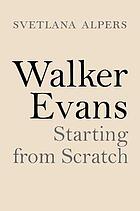
Walker Evans
Starting from Scratch
- اطلاعات
- نقد و بررسی
- دیدگاه کاربران
نقد و بررسی

June 1, 2020
Alpers's (The Art of Describing) comprehensive study explores American photographer Walker Evans (1903-75) and is the first comprehensive analysis of a photographer by this scholar best known for specializing in 17th-century Dutch painting. Weaving a discussion of photography's essential characteristics through her text, Alpers shows how Evans's approach differed both from that of other photographers and from conventional assumptions about photography. The title investigates photographers whose work influenced Evans (significantly, Eug�ne Atget) but is particularly valuable for its examination of Evans's literary influences. The author makes a compelling argument for the impact of 19th-century novelist Gustave Flaubert's style of realism and naturalism on the young Evans. With 170 black-and-white and color plates, the book begins with a gallery of Evans's photos. This is followed by seven chapters of critical commentary on major phases of his career (in particular, the Cuba photos, travels through the American South, and the New York City subway portraits). Quotes from Evans's own writing and lectures, together with the words of curators who worked with Evans (John Szarkowski, Lincoln Kirstein) and references to artist and writer contemporaries (e.g, . Edmund Wilson, Elizabeth Bishop) enrich the analysis. VERDICT Intriguing interpretations of Evans's photos and work process, for both specialists and general readers.--Michael Dashkin, New York
Copyright 2020 Library Journal, LLC Used with permission.

July 15, 2020
A fresh, scholarly look--complete with more than 200 images--at the seminal American photographer, this time through the lens of fine art and literature. In a lavishly illustrated narrative bolstered by impassioned research, art historian Alpers reintroduces readers to Walker Evans (1903-1975), one of America's great artistic observers. Evans began his career dreaming of becoming an expat writer like those of the Lost Generation, and Alpers finds a literary core at the center of his creative makeup. In addition to "having an eye" for photography, Evans was a storyteller and a ruthless editor of his own work. He was meticulous about word choice in his writing and public speaking; in his photography, he tirelessly revised, endlessly searching for the perfect crop. Evans was an avid reader, and Alpers turns to books to unlock his oeuvre (Flaubert looms large). She similarly mines the realm of art history but occasionally reaches too far: After astutely likening the documentarian nature of her subject's undeveloped rolls to a painter's plein-air sketchbook, she goes on to compare Evans to Paul C�zanne and his many graphite studies. Elsewhere, she connects Evans to Edward Hopper, but "coming as I do from historic European art, the horizontal, two-page composition reminds me of a fifteenth-century Italian predella panel." Alpers periodically touches on Evans' well-documented commercial projects--e.g., Let Us Now Praise Famous Men, his celebrated collaboration with James Agee--but primarily searches for new ways to understand Evans' work as a whole. She resists seeing his work as nostalgic; quoting Evans, she explains that he was "interested in what any present time will look like as the past." Recalling critic Clement Greenberg, Evans saw photography as "the most literary of the graphic arts," and Alpers convincingly presents him as a new kind of poet: "a photographer inventing a new language of images for America." Great American photography in a welcome new frame.
COPYRIGHT(2020) Kirkus Reviews, ALL RIGHTS RESERVED.




دیدگاه کاربران